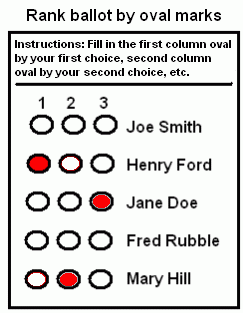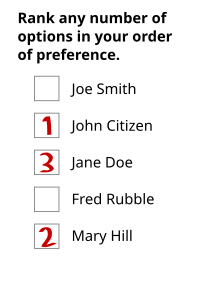
Approval voting is a single-winner electoral system in which voters mark all the candidates they support, instead of just choosing one. The candidate with the highest approval rating is elected. Approval voting is currently in use for government elections in St. Louis, Missouri, Fargo, North Dakota and in the United Nations to elect the Secretary General.

Plurality voting refers to electoral systems in which the candidates in an electoral district who poll more than any other are elected.

Proportional representation (PR) refers to any type of electoral system under which subgroups of an electorate are reflected proportionately in the elected body. The concept applies mainly to political divisions among voters. The essence of such systems is that all votes cast – or almost all votes cast – contribute to the result and are effectively used to help elect someone. Under other election systems, a bare plurality or a scant majority are all that are used to elect candidates. PR systems provide balanced representation to different factions, reflecting how votes are cast.

The two-round system, also called ballotage, top-two runoff, or two-round plurality, is a single winner voting method. It is sometimes called plurality-runoff, although this term can also be used for other, closely-related systems such as ranked-choice voting or the exhaustive ballot. It falls under the class of plurality-based voting rules, together with instant-runoff and first-past-the-post (FPP). In a two-round system, both rounds are held under choose-one voting, where the voter marks a single favorite candidate. The two candidates with the most votes in the first round proceed to a second round, where all other candidates are excluded.

The single transferable vote (STV), a type of proportional ranked choice voting, is a multi-winner electoral system in which each voter casts a single vote in the form of a ranked-choice ballot. Voters have the option to rank candidates, and their vote may be transferred according to alternative preferences if their preferred candidate is eliminated or elected with surplus votes, so that their vote is used to elect someone they prefer over others in the running. STV aims to approach proportional representation based on votes cast in the district where it is used, so that each vote is worth about the same as another.
Strategic or tactical voting is voting in consideration of possible ballots cast by other voters in order to maximize one's satisfaction with the election's results. For example, in plurality or instant-runoff, a voter may recognize their favorite candidate is unlikely to win and so instead support a candidate they think is more likely to win.

A Condorcet method is an election method that elects the candidate who wins a majority of the vote in every head-to-head election against each of the other candidates, whenever there is such a candidate. A candidate with this property, the pairwise champion or beats-all winner, is formally called the Condorcet winner or Pairwise Majority Rule Winner (PMRW). The head-to-head elections need not be done separately; a voter's choice within any given pair can be determined from the ranking.

Voting refers to the process of choosing officials or policies by casting a ballot, a document used by people to formally express their preferences. Republics and representative democracies are governments where the population chooses representatives by voting.
Electoral systems of the Australian states and territories are broadly similar to the electoral system used in federal elections in Australia.
Historically, the single transferable vote (STV) electoral system has seen a series of relatively modest periods of usage and disusage throughout the world; however, today it is seeing increasing popularity and proposed implementation as a method of proportional representation and a goal of electoral reform. STV has been used in many different local, regional and national electoral systems, as well as in various other types of bodies, around the world.
Instant-runoff voting (IRV) is a ranked voting method used in single-winner elections. IRV is also known outside the US as the alternative vote (AV). Today it is in use at a national level to elect the Australian House of Representatives, the National Parliament of Papua New Guinea, the President of Ireland and President of India. In Australia it is also used for elections to the legislative assemblies of all states and territories except Tasmania and the Australian Capital Territory, and for the Tasmanian Legislative Council.
Later-no-harm is a property of some ranked-choice voting systems, first described by Douglas Woodall. In later-no-harm systems, increasing the rating or rank of a candidate ranked below the winner of an election cannot cause a higher-ranked candidate to lose.
There are a number of complications and issues surrounding the application and use of single transferable vote proportional representation that form the basis of discussions between its advocates and detractors.

Multiple transferable voting, sometimes called block preferential or block instant-runoff voting, is a winner-take-all system for electing several representatives from a multimember constituency. Unlike single transferable voting (STV), preferential block voting is not a method for obtaining proportional representation, and instead produces similar results to plurality block voting. Preferential block voting can be seen as a multiple-winner version of instant-runoff.

Plurality block voting, sometimes conflated with the broader term block voting (BV) is a winner-take-all method for multi-winner elections. Each voter may cast as many votes as the number of seats to be filled. The candidates with the most votes are elected. The usual result when the candidates divide into parties is that the most-popular party in the district sees its full slate of candidates elected, even if the party does not not have support of majority of the voters.

The Borda method or order of merit is a positional voting rule which gives each candidate a number of points equal to the number of candidates ranked below them: the lowest-ranked candidate gets 0 points, the second-lowest gets 1 point, and so on. Once all votes have been counted, the option or candidate with the most points is the winner.

Instant-runoff voting (IRV) is a winner-takes-all multi-round elimination voting system that uses ranked voting to simulate a series of runoff elections, where the last-place finisher according to a plurality vote is eliminated in each round. Its purpose is to elect the candidate in single-member districts with majority support even when there are more than two candidates. IRV is most closely related to two-round runoff election.

The 2009 Burlington mayoral election was the second mayoral election since the city's 2005 change to instant-runoff voting (IRV), also known as ranked-choice voting (RCV), after the 2006 mayoral election. In the 2009 election, incumbent Burlington mayor won reelection as a member of the Vermont Progressive Party, defeating Kurt Wright in the final round with 48% of the vote.

An electoral or voting system is a set of rules used to determine the results of an election. Electoral systems are used in politics to elect governments, while non-political elections may take place in business, non-profit organisations and informal organisations. These rules govern all aspects of the voting process: when elections occur, who is allowed to vote, who can stand as a candidate, how ballots are marked and cast, how the ballots are counted, how votes translate into the election outcome, limits on campaign spending, and other factors that can affect the result. Political electoral systems are defined by constitutions and electoral laws, are typically conducted by election commissions, and can use multiple types of elections for different offices.

Ranked voting is any voting system that uses voters' rankings of candidates to choose a single winner or multiple winners. More formally, a ranked system is one that depends only on which of two candidates is preferred by a voter, and as such does not incorporate any information about intensity of preferences. Ranked voting systems vary dramatically in how preferences are tabulated and counted, which gives them very different properties.





